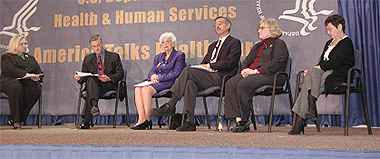|
Townhall
Meetings
Ensuring the Health and Wellness of Our Nation’s
Family Caregivers
December 16, 2003 · 10:00am – 12:00pm · Washington,
D.C
Deputy Secretary of Health and Human Services Claude Allen hosted
a town hall meeting to highlight the important role of health
promotion and disease prevention activities in ensuring the health
and wellness of one of long-term care’s everyday heroes – our
nation’s family caregivers. 
(Photo – Claude Allen, Michael
O’Grady, John Hoff,
Josefina Carbonell, Donald “Mac Showers, Katryna Gould,
Bill Kays)
Family caregivers are a critical source of
care to older persons with disabilities and chronic health problems.
The unpaid and informal care they provide is an essential source
of help for disabled elders in the community. If the work of
family caregivers had to be replaced by paid home health care
staff, research shows a significant cost to the nation of $45
billion to $94 billion per year.
It is generally recognized that caring
for an older person with a disability or chronic condition
is burdensome and stressful
to many family caregivers and contributes to psychiatric and
physical morbidity. Accordingly, about a third of these caregivers
describe their own health as “fair to poor.” Recent
research findings suggest stress associated with family caregiving
can result in increased risks of infectious diseases, such as
colds and flu, depressive symptoms, and chronic diseases, such
as heart disease, diabetes and cancer. Family caregiving, when
accompanied by emotional strain, has also been found to be an
independent risk factor for mortality among older adults caring
for loved ones.
Researchers have also shown that family
caregivers are less likely than peers of the same age to engage
in health-promoting
behaviors that are important for chronic disease prevention and
control. Given that the demands of caring for a loved one may
compromise caregiver health and functioning and increase caregivers’ risk
of developing physical health problems, there is a pressing need
to encourage family caregivers to engage in activities that will
benefit their own health, well-being, and longevity.
In response to these finding, the Department of Health and Human
Services saw this town hall meeting as an opportunity to:
- highlight the important contribution
of the people on the “front
lines” of caring for the elderly and those with
disabilities;
- recognize these everyday heroes for
their “can-do” attitudes
and generosity toward their family members, friends,
and neighbors;
- acknowledge the importance of health
promotion and disease prevention activities for family caregivers;
- introduce
examples of family caregivers who are “living
well” because of health promotion/disease
prevention activities; and
- speak on the importance
the Department places on encouraging the health
and well-being of America’s
caregivers.
Mr. Donald “Mac” Showers, Ms. Katryna Gould and
Mr. Bill Kays, who are former and current caregivers, were on
hand to deliver testimonies of their caregiving experiences and
also, discuss the positive impacts that health promotion activities
have on their quality of life with Deputy Secretary Allen.
These caregivers provided
the audience with some valuable lessons learned including–
- It is necessary to care for
the caregiver as it is to care for a loved one.
- Get adequate
rest and exercise.
- Have a sense of humor.
- Acknowledge your own poor and adverse
health.
- Do not ignore your own health. If you do not take
care of yourself, in the long run, you will not be able to
be a good
caregiver
for someone else.
- Recognize when you are no longer
able to care for your loved one.
- Do not be ashamed to ask
for help.
- Seek balance in your life as a caregiver by taking
time out four your own needs and interests.
- Consider
joining a support group. Such groups can be extremely valuable
in providing a safe
place to
share
personal experiences
and feelings with others who are in similar
circumstances.
Researchers and representatives from
organizations that provide support for family caregivers were
also on hand to highlight
the reasons that might contribute to the physical and emotional
strain that family caregivers experience. Some of these reasons
could include–
- Internal sources of stress that
come with providing care to a chronically ill relative;
- External
sources of stress such as transportation and financial
pressures associated with caregiving (on average, caregivers
spend 11% out-of-pocket for services not covered by Medicare);
- Chronic stress in never knowing what
challenge will come next; and
- Barriers to health promotion
activities may include lack of time, respite care, depression,
guilt and denial.

(Photo -- Josefina Carbonell, Jonathan Ortman, Margaret Gianinni,
Richard Schulz,
Carol Levine and Suzanne Mintz)
The panelists also emphasized ways in
which family caregivers can ease some of their caregiving burden
and facilitate more
engagement in health promotion and disease prevention activities.
Some of these might include–
- Use the opportunities when taking a loved
one to the doctor to address concerns and/or ask questions
about your own health.
- Prevent adverse health by getting immunized
and obtaining routine screenings.
- Also be mindful of your
own nutrition.
- Do not try and do everything by yourself. Ask
for help from others and utilize local resources, such as
the Eldercare
Locator
at 1-800-677-1116.
- Quality respite services can allow
family caregivers to have a break from their current pressing
challenges
and give them
some much needed time to themselves.
- Be aware of the
all of the programs and services available to ease the burden
of caregiving, such
as the National
Family Caregiver Support Program.
Related Links:
|